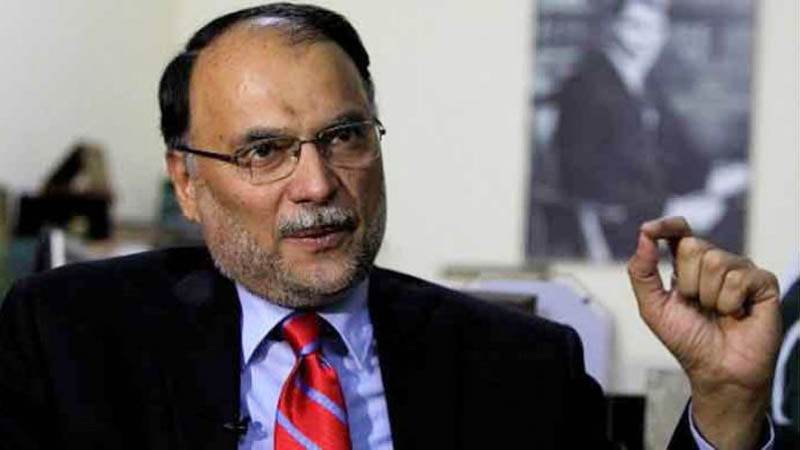 ISLAMABAD: Interior Minister Ahsan Iqbal on Thursday said that owing to Islamabad police’s remarkable performance, the city of Islamabad had become one of the safest and the most secure federal capitals in the world.
ISLAMABAD: Interior Minister Ahsan Iqbal on Thursday said that owing to Islamabad police’s remarkable performance, the city of Islamabad had become one of the safest and the most secure federal capitals in the world.
He stated this while addressing the inaugurating ceremony of Diplomatic Enclave Riding Club. Islamabad Chief Commissioner Zulifqar Haider, Inspector General of Police Dr Sultan Azam Temuri, DIG (Security) Waqar Ahmed Chohan, SSP Operations Najeebur Rehman Bugvi, SSP (Security) Jamil Hashmi, SP Zeeshan Haider, SSP Headquarters Hassan Iqbal, SP Headquarter Sumera Azam, diplomats from various countries including South Korea, Saudi Arabia, Palestine, Azerbaijan and other countries, and members of business community were present.
Appreciating the Islamabad police’ performance, the minister sad that they were trying to make Islamabad police a role model by equipping them with state of the art technology.
The minister said Pakistan had rendered unprecedented sacrifices in the war against terrorism. Pakistan, he said was fighting its own war against terrorism only to secure its future generations and it had declared it a national challenge to win the war.
Dr Sultan Azam Temuri said that on special directions of the Interior Minister, the riding club was established by the Islamabad Mounted Police to provide the diplomats and others, especially young people an opportunity to learn and enjoy horse riding.
He said a state of the art gymnasium in diplomatic enclave has also been established to provide healthy activities to the diplomats and other people. He informed that a shooting club would also be established soon in the diplomatic enclave.
The minister further lauded the performance of Waqar Ahmad Chohan and Jamil Ahmad Hashmi and awarded them with shields. Later, the IGP also gave out a shield to Ahsan Iqbal.
In a separate meeting on Thursday, in which a seminar was held titled ‘Disparities In Police Systems In Provinces & The Federal Capital, which was organized by the Sustainable Development Policy Institute (SDPI), Ahsan Iqbal said, “One of the biggest challenges Pakistan is faced with for the last 70 years, is the lack of a stable political system and discontinuity in policies.”
The seminar was attended by a select number of police officials, lawyers and legislators.
The Interior Minister said that since independence, every single political government was either derailed or destabilised, which led to a non-implementation of reforms, especially in the police department.
“The failure in the implementation of previous police reforms resulted in an unstable society, lack of key stakeholder’s involvement and lack of consensus on the reforms initiative,” he said.
“For the implementation of reforms in any sector, including police, we have to ensure a peaceful and stable democratic system, which is the future of Pakistan. Otherwise, the same story of destabilisation of political system will be repeated every time and the country will remain in the state of oblivion,” he added.
Former Sindh governor Moinuddin Haider, on the occasion, said that in any society, the local government and policing are two important pillars and institutions for wellbeing and prosperity of the public.
“However, in Pakistan, our police is highly politicised and is being used for serving personal interests,” he said, adding, that police order 2002 is an excellent document and should be implemented in all four provinces, including Gilgit-Baltistan, Azad Jammu & Kashmir, FATA and Baluchistan.
SDPI Executive Director Dr Abid Qayyum Suleri said that Pakistan had witnessed around 28 different police reform initiatives, but none yielded its fruits due to a lack of ownership at all levels.
“The implementation of different police orders in parts of Pakistan, in fact, has generated disparities among the police force,” he said, adding that it also has reflection on the people experiencing policing in a different manner.
“A person at work in Islamabad has to experience policing according to the Police Act 1861 while the same person in Rawalpindi has to experience policing according to the Punjab Police Order 2013, which is an amended version of the Police Order 2002,” he maintained.
“One of the challenges of the rule of law in our country is reforming police on modern methods to ensure a just and peaceful society,” said Dr Abid said, adding that for that matter there is a need to analyse the pros and cons of the two diverse prevailing police orders being implemented in the federal and provincial capital.
Intelligence Bureau former director general Dr Shoaib Suddle, said that the Police Order 2002, which was promulgated on August 14, 2002 replaced the Police Act 1861 in all four provinces of Pakistan.
“This was not extended to the Islamabad Capital Territory, Gilgit-Baltistan or Azad Jammu & Kashmir,” he said, adding that based on the Police Order 2002, Punjab and Khyber Pakhtunkhwa introduced their own orders.
Published in Daily Times, February 23rd 2018.